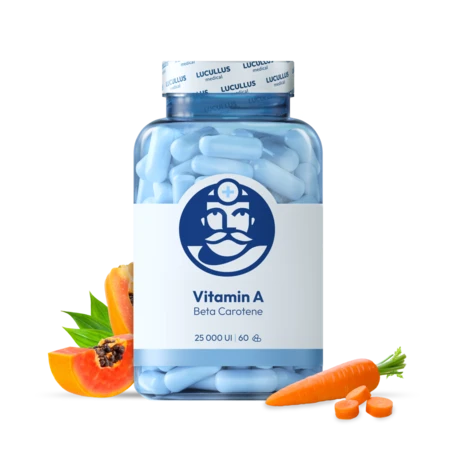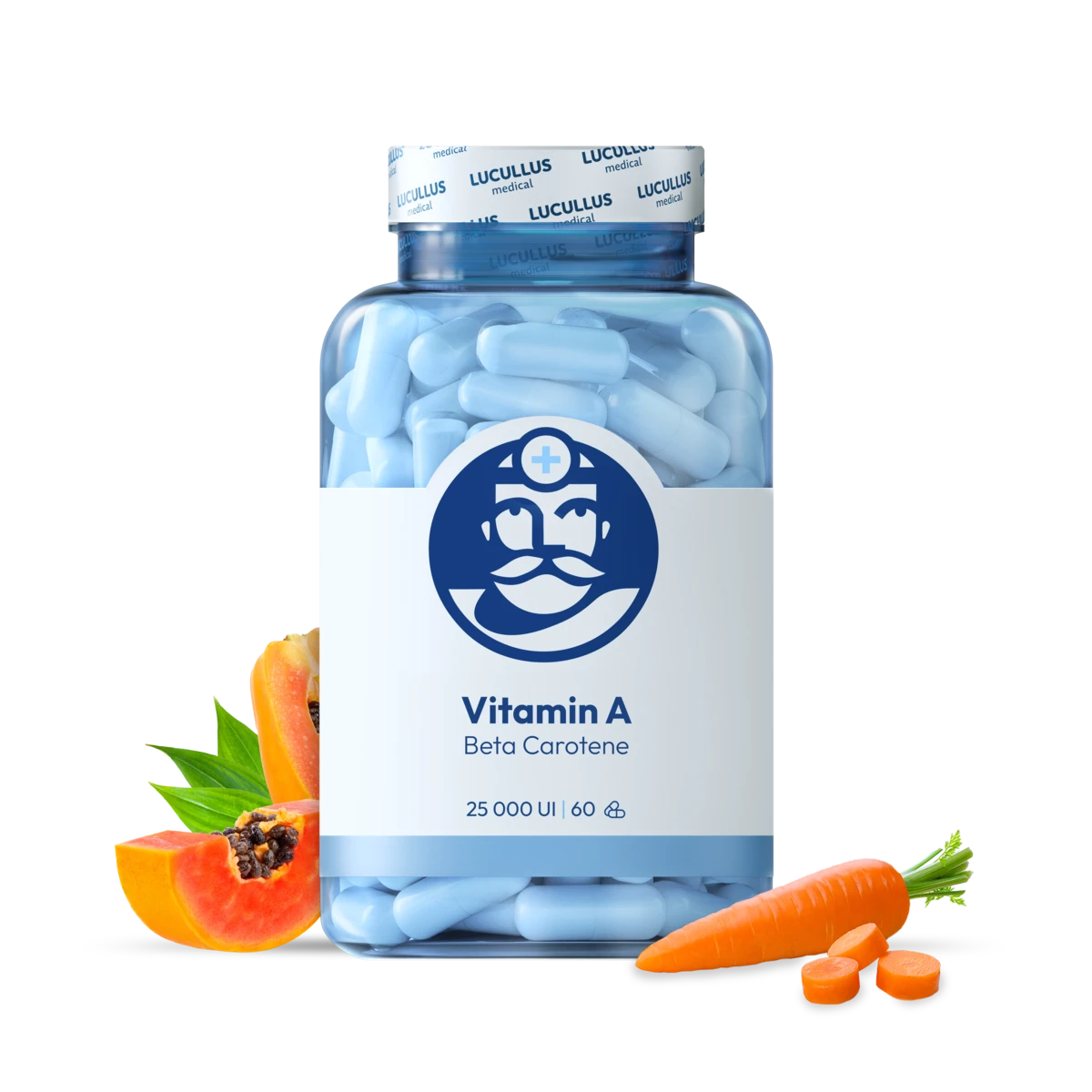
Účinky
Support for healthy visionStrengthening the immune systemImprovement of skin healthOptimal absorption of beta-caroteneCombination of science and nature
Pack of 60 capsules
| Active ingredient | In daily dose | % Ref |
|---|---|---|
| Vitamin A (beta-carotene) | 15 mg | 1875.00% |
Ingredients: Vitamin A (beta-carotene), bulking agent: microcrystalline cellulose, capsule made of gelatin.

Read the latest news about quality dietary supplements, vitamins, immunity, and health.

Je v rôznych krajinách nie náhodou označovaná pojmami „ huba nesmrteľnosti “ a „ huba večného života “. V Japonsku „ Reishi “ znamená „ duchovná sila “. V Číne je známa ako „ Lingzhi “, čo znamená „ božská huba “. Patrí medzi jednu z najcennejších húb tradičnej medicíny, využíva sa na liečbu chronických ochorení a uznáva sa už viac ako 4000 rokov pre silné účinky (podobné ženy) zdokumentované v starovekých knihách. Nazýva sa aj „ hubou šťastia “ pre jej schopnosť trpiaci ťažkosťami, ako sú artritída, nespavosť, tlak na bolesť, pretrvávajúca slabosť, vysoký krvný tlak srdca, závraty, otravy hubami a ochorenia ...

V starom filme je scéna, kde babka alebo dedko nútia každé ráno malé deti vypiť lyžičku rybieho oleja. Deti to nenávidia, chutí to odporne. „Ale budeš zdravý!“- znie veta starostlivých starkých. Odkiaľ sa toto vzalo? , platí dodnes, akurát veda dokázala zázračný rybí tuk premeniť na "obyčajné" tablety, alebo extrakty s normálnou nie sú chuťou.

Niacin was long considered a mere part of the diet until it was discovered that its deficiency causes skin, digestive, and mental problems known as pellagra. Doctor Goldberger proved that the cause of this disease is not an infection but a one-sided diet without vitamin B3. He conducted an experiment on himself and his colleagues, who consumed exclusively poor diets and began to show symptoms of pellagra. However, when they added nutrients rich in niacin to their diet, the symptoms disappeared. In 1937, niacin was isolated from the liver, confirming its importance and nutritional value.

Sometimes it seems at first glance that we have everything under control, but the reality is often different. "Liters" of coffee, fast food between duties, endless deadlines, constantly ringing phones. The result is fatigue, problems with concentration, forgetting even simple things, moods changing faster than the weather, and nights full of tossing and turning, as if our mind is running at a minimum. In a hectic pace, we do not realize the importance of proper nutrition. The good news is that nature can save us, in nature everything can be in harmony if we combine it from nature, it is a mysterious duo of choline and inositol.It is an ideal combination not only for the body but also for a tired mind, which is calling for help. Although many are unaware of them, choline and inositol work in every cell of our body, keeping our brain in shape, liver clean, and nerves strong. Their effects were discovered relatively recently. Why should we pay attention to these nutrients?

Vedeli ste, že síra je pre naše telo rovnako nevyhnutná, ako vitamíny či minerály? Jedným z jej najvýznamnejších zdrojov je látka nazývaná metylsulfonylmetán, skrátene MSM. Napriek tomu, že názov znie, ako z učebnice chémie, ide o prirodzenú látku tak zásadným významom pre správne fungovanie organizmu. MSM sa prirodzene vyskytuje v krvi, tkanivách a orgánoch, kde podporuje látky, ako sú aminokyseliny - glutatión, cysteín a metionín. Táto organická zlúčenina síry, známa aj ako organosulfur je mimoriadne účinná v boji proti oxidačnému stresu, zápalom a pri regenerácii tela. Jej zdrojom môžu byť prírodné potraviny. Organosírne zlúčeniny, ako napríklad aličín v cesnaku, majú široké zdravotné využitie, a MSM je jedinečný v tom, že ponúka komplexnú podporu od zdravia kĺbov až po posilnenie imunity .

Vitamín B1 patrí do skupín B1 až B12, ktoré označujeme pod spoločným názvom B-komplex. Pod týmto menom je potrebné doplniť všetky vitamíny tejto skupiny. Čo však potrebujem len jeden z nich? Potrebujete aj celú skupinu - tie najdôležitejšie vitamíny zo skupiny B je možné dostať samostatne.